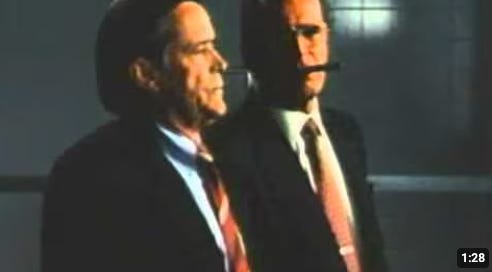Stress Makes You Stupid
A lesson from Barbarians at the Gate.
Barbarians at the Gate, the chronicle of the leveraged buyout of RJR Nabisco, set amid the excess of 1980s Wall Street, is my favorite business case study. It’s a great book made into a great movie. The hubris, betrayal, and high drama it contains are nearly Shakespearean.
I’ve been listening to the audiobook recently (all 22+ hours of it), some with my son on a long drive back from Colorado to Austin. The tale of RJR Nabisco, its management, and its would-be buyers is full of lessons for leaders. But the lesson that struck me most forcefully this time is the way that sustained stress erodes our decision-making ability.
Barbarians at the Gate vividly describes the mental state of RJR Nabisco CEO F. Ross Johnson as he loses control of what he thought was a brilliant plan. Frustrated by Wall Street’s perceived undervaluing of his company’s stock, Johnson and team hatched a scheme to take the company private using oceans of borrowed money. LBOs were big on the scene as a strategic ploy at the time, and going private would result in less scrutiny and more control, not to mention a potentially massive windfall for Johnson himself.
Of course, that’s not how it went.
Just F--- It!
Before Johnson could complete the deal, news leaked of RJR Nabisco’s plan. A bidding war started. Suddenly the deal privately constructed by Johnson’s management team had competition… and offers that looked better to the board.
The ensuing chapters of the book show Johnson worn down by reversals, demands, backstabbing, and a harsh spotlight cast on him in the business press, where he was portrayed as the epitome of corporate greed. To top it all off, Johnson’s 26-year-old son was in a near-fatal car accident around this time, leaving him in a coma.
Understandably, the stress gets to Ross Johnson. We watch as he begins to care less about which outcome makes the most sense (for shareholders, his team, and himself) and just getting the damn thing over with.
As the process drags on, Johnson has the emotional reaction almost all of us do under sustained stress: Just f--- it.
The authors describe Johnson as vacillating between wanting to “give up one minute and wring the board’s collective neck the next.” As the end nears—even though it won’t be a good outcome for him—Johnson feels a burden being taken from him. He starts cracking jokes again. Thank God. It’s over.
Few of us will face the kind of high drama described in Barbarians at the Gate, but nearly all of us will experience that reaction to ongoing stress and scrutiny. The discomfort, especially for someone at the CEO’s level who bears so much responsibility, gets so bad that you’ll wave the white flag just to have it stop. You’re like the accused person sitting in an interrogation room, hounded by detectives for hours, who finally says “Screw it” and admits to a crime they didn’t commit.
It’s an emotional reaction, not a cognitive one. And in those “Just f--- it” moments, we often make some of the biggest missteps of our careers.
Stress Weakens Your Brain
It's a real neurological phenomenon, too. Researchers like Amy Arnsten of Yale have found that stress weakens the prefrontal cortex, which governs planning, focus, and decision-making. When we feel assaulted from all sides, we lose access to critical thinking faculties.
Another meta-analysis found that overall, stress exposure leads to more disadvantageous and risky decisions than non-stress conditions. This effect is particularly pronounced in individuals with higher baseline impulsivity. In Johnson's case, we see this play out dramatically. His initial judgment about the LBO was likely clouded by some level of stress, and his subsequent decisions deteriorated as pressure mounted.
Learning from the Pros
We CEOs could learn a thing or two from elite athletes, who generally have much more sophisticated approaches to managing stress during high-stakes moments.





